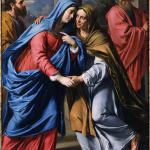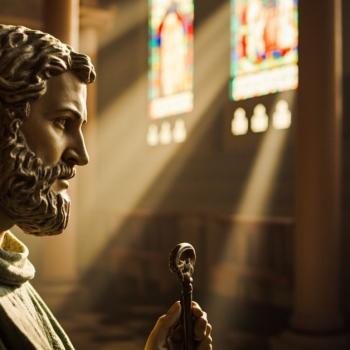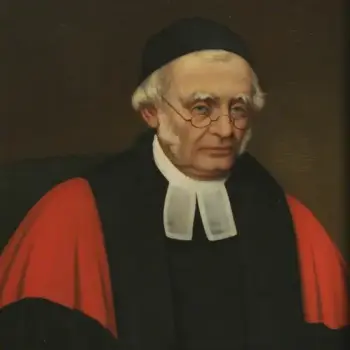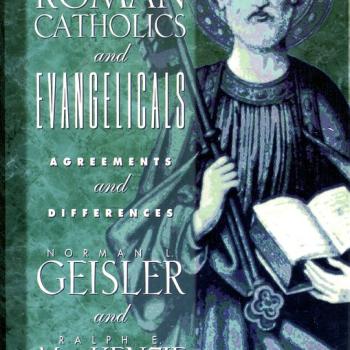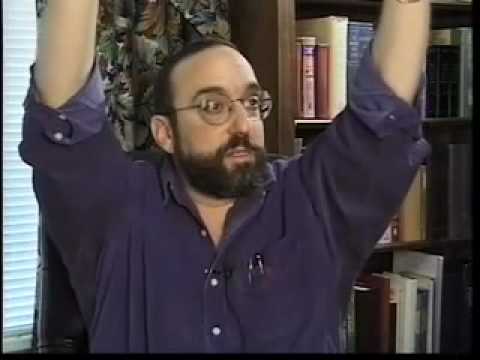
This is my response to Steve Schlissel‘s article: “What Thinkest Thou?” (no longer online). I initially replied:
Pastor Schlissel might do even better in his ecumenical maturation process if he would drop the antiquated and baggage-laden terms “Romanism” and “Romanists” (much beloved of anti-Catholics; all we need is “Romish” too) Even James White can agree to that much.
I know it is too much to ask to refer to us as simply “Catholics,” but the Anglican-originated “Roman Catholic” would be acceptable (even though it excludes those members of the Catholic Church in 21 or so non-Latin rites; aka Eastern Catholics).
Why the unneccesary annoyance of terminology, in an effort to build bridges? Or is it just remnants of a previous anti-Catholicism undergoing a change for the better?
The last time I saw someone use “Romish” when he knew better, I immediately wrote and asked if I could use the descriptives “Genevish” or “Wittenbergish.” The point was readily, graciously acknowledged, and he (a Presbyterian pastor) issued a disclaimer. :-)
Kevin Johnson (who calls himself a “Reformed Catholic”) asked me to reply in full. Here is his comment:
I agree Dave that we don’t always use the right vocabulary but I would love to hear your actual thoughts on the substance of Pastor Schlissel’s article. I would think it would be very encouraging on your side to see much of what Pastor Schlissel is saying become more popular in the Reformed world even though he and others might retain some sort of cultural affinity towards their forefathers in regards to issues like terminology. But I am very interested in your thoughts regarding the actual substance of what Pastor Schlissel said in his article.
[omitting things I have no comment on one way or the other]
Speaking personally, my attitude has undergone major changes over the last 25 years. Speaking plainly, I’m still confused, sometimes changing my attitude day to day. For example, since coming to serve at the hospital I’ve become reacquainted with some of the worst Rome has to offer. My office is connected to the chapel which serves both Catholic and Protestant populations at Coney. While plans are (gratefully) underway to make physical alterations and improvements to this shared set-up, for now the statues upon which so many Romanists depend stand in plain view. And observation confirms that the behavior of many of Rome’s children cannot be properly described without use of the word “idolatrous.”
This is the same old ludicrous charge of automatic idolatry, simply based on the presence of a statue. I think you (Kevin) might agree with me that idolatry is determined in the end by the state and condition of one’s heart and intent in worship, not by religious images as a supposed universal violation of one of the Ten Commandments. But hey, this is the original predominant Calvinist position (iconoclasm), so Pastor Schlissel can claim to be in the “mainstream” on this one.
I have seen the See of Rome’s subjects enter quickly into the chapel, apply the so-called “holy water,” hasten over to their favorite idol (most often Mary),
Again, how does he know it is an “idol” without the power to see into one’s heart and know what is going on in their heart, mind, and soul at that moment? I am amazed at the haughty presumption here; it’s breathtaking (but I know from whence it is derived).
. . . kneel before it, utter adoration of some kind,
How does he know it is “adoration,” for heaven’s sake?
then scurry out, utterly convinced that they have just rendered some sort of service before God which He finds acceptable, even creating in them that assurance so commonly joined to superstitious ritual, that the act just performed will be repaid by the deity with some bonus oversight and protection, perhaps a couple of extra angels dispatched to keep guard until their next idolatrous moment.
Condescending hogwash, uttered in obvious ignorance . . . certainly not worthy of a response, but let me say that I find such a comment ironic and amusing, particularly in the mocking of “assurance” (coming from a Calvinist, of all people?!). The tables can easily be turned on this one . . .
If I sound a tad too cynical, add another apology.
Not so much cynical as misguided and wrongheaded . . . (with all due — sincere — respect). I’m sure the pastor is a fine man, and a great servant of God, but he is simply ignorant of (at least some aspects of) Catholic theology; a strange phenomenon on the blog which has featured the fine work of Paul Owen, who shows an extraordinary grasp of Catholic theology, though he disagrees with it. It IS possible! The contention of Dr. Owen that Catholics are not Pelagians was by itself enough to make me jump for joy and renew my hope in Protestant mankind . . . :-) I can say something for years and most Protestants who see it pass right over it, but it is a joy to see an articulate Reformed spokesman say the same thing. Now maybe it’ll get through . . . Kudos!
It just rankles a man to see such self-deception.
I know the feeling; I am rankled viewing such correctable ignorance and seeming inability to grasp basic distinctions (again, agree or disagree).
Witnessing such flat out ignorance in action, I become inflamed and grieved, turning over and over in my mind the question of responsibility: how did these poor souls become so religiously abased, deprived, misled?
Indeed; I can TOTALLY relate, reading this piece . . . so see, common ground is being achieved after all! We can relate to each others’ feelings!
At other times, seeking the larger picture, I remember that Rome hardly enjoys a corner on self-deception.
Good (though a self-evident truism).
And I remember that no Protestant could, no Protestant should think of his religious history as one completely severable from Rome. We Protestants are Western Christians, and our line does not go back from us to Calvin with a leap from there clean back to Paul.
Also self-evident, but nice to see stated in these circles.
Calvin, for example, appealed without shame or qualification to Bernard of Clairvaux (1090-1153), a bona fide saint of Rome—and Geneva!
But of course. The question is whether Calvin was consistent in doing so. How did he interpret the simultaneous “acceptable” piety or theology in St. Bernard alongside the so-called “idolatry”? How can this be? How can one be so right on one topic and yet be deluded and sunk into a slimy pit of idolatry?
It reminds me of R.C. Sproul’s semi-amusing “co-option” of St. Thomas Aquinas, as if he wasn’t every bit as Catholic as Pope John Paul II, and would have been a good Protestant had he lived 300 years later. And of course, this can become a general question to be asked of Protestants trying to understand Catholics who seem to be halfway decent Christians, yet inexplicably accept all Catholic teachings.
In fact, Bernard is a fine example to keep in mind when discussing our topic, for he represents in a man the inextricable and inexplicable contradictions one will encounter in any effort to understand, absorb, or own (i.e., appropriate as ours) Christian history. In Bernard we find a seriously devout follower of Mary, the author of a complete treatise on Mariology, “Praises of the Virgin Mother.” He is also the author of that matchless hymn of devotion, “O Sacred Head , Now Wounded,” sung to this day with tears by Christians of every stripe, and found in the Reformed Psalter Hymnal, as well as in every significant Presbyterian Hymnal. What Christian could fail to affirm that Bernard has expressed for him the love and awe of his own Christian heart when he penned, “What Thou, my Lord, hast suffered was all for sinners’ gain. Mine, mine was the transgression, but Thine the deadly pain. Lo, here I fall, my Savior, ‘tis I deserve Thy place; look on me with Thy favor, vouchsafe to me Thy grace.” Who can even quote this, let alone sing it, without tears? Yet Bernard, championed by Calvin, was a champion of Mary.
That should tell the good pastor something, but the chances of that happening are, I suspect, slim. I hope I am wrong. But I thank him for this observation, because it is something all Protestants who seek to be ecumenical, have to grapple with. Mary is always a “biggie.”
At the same time, no one could doubt that he was, above all, a champion of Christ.
How can this be? Idolatry, by definition, is replacing God and substituting something else. If Mariology is always Mariolatry, then Bernard could not possibly have been a “champion of Christ” (due to the extreme seriousness and wrongness of idolatry). But if he was that champion, then maybe, just maybe, Mary can be regarded and venerated in a fashion that is not idolatrous?
And he was a monk.
Oh my! Heaven forbid that anyone deny themselves sex for the sake of the Kingdom!!!! Why is that so rare in Protestantism, despite the very clear teaching of our Lord Jesus about certain eunuchs, and St. Paul, in 1 Corinthians 7?
Yet, here again, to even approach the subject of monasticism brings us square in the face of the complexity of our history.
Why, pray tell? — it being explicitly biblical?
I am a Christian who unabashedly promotes the cause of covenant, with a special emphasis on the fact that Christianity is only fully lived if lived in covenant community.
Monks do live in community. They merely separate themselves from the society-at-large for the sake of prayer and spiritual betterment. Is prayer now suspect? One can devote themselves to making shoes or donuts and be a good ole Reformed Christian, but not exclusively to prayer and other such directly spiritual endeavors? I’ve always been amazed at the opposition to such things. It was never an issue for me at any time before I converted.
Further, I see in Scripture the ideal set forth for our emulation of a strategy of missions that is city-centered. To go one step further, it is a religion provided for the redemption of life lived in the world, not one encouraging flight from the world.
I fail to see why some cannot devote themselves to the monastic lifestyle. There are more than enough of us out in the world. What we need is to get those people off their butts (and they are legion in both Protestantism and Catholicism: a pastor surely is well aware of this) and seriously doing something for the Kingdom, not go after monks because they are supposedly anti-worldly or anti-cultural. That is simply more of the incessant Protestant false dichotomizing.
It would be difficult to imagine a lifestyle more radically opposite to all this than anchorite monasticism! But in Bernard we have a monk. What am I to do?
Stop making false dichotomies!
Love him. Of course, loving him keeps me not from evaluating him and his doctrines, but love requires that I recognize his contributions.
Same with me and Pastor Schlissel. We agree on that. I would love to get together and talk all night. I would love to talk on the phone (I have unlimited calling). I would love to discuss the many things where we agree. But will it actually happen? It is up to Pastor Schlissel.
Similarly, love requires us to recognize the contributions of monks to Western, that is, to our history. After the fall of the Western Empire in 476, the pope was left “as the only effective force for order in the West.” In the centuries which followed, the papacy aligned with the Carolingian dynasty and, “with the assistance of a remarkably vital and active monastic community, Christianized the barbarian invaders…” (Encyclopedia of World Religions, p. 938). Have we given adequate recognition to the monastic movement, which did more than preserve Christianity and civilization itself, but which advanced both through the incredibly courageous and Herculean mission which resulted in the conversion of the barbarian hordes to Christianity? It is passing belief that anyone would do anything but boast in such a magnificent legacy. Would we, in sheer stubbornness, hand this over to Rome, or may we not properly lay claim to it as ours?
Good, but again, personally, I have thought all this was self-evident (before I converted, and now), so it is not, in my opinion, some amazing thing to make such an admission. Good (again), even great and necessary, but not especially praiseworthy to simply acknowledge the historically- and ecclesiologically obvious.
No, this question of attitude toward Rome is no easy one.
I think it is very easy: “Rome” is a variation of Christianity not different at bottom from denominational differences within Protestantism. But we are always placed in a unique category (one can hardly imagine, e.g., an article like this being written about, say, Lutherans or Methodists — it is always Catholics; oops, “Romanists”).
Obviously there are more differences to work through, but once the Christian status is granted, then I don’t see how it is all that different (in the sense of acknowledging a fellow Christian group) from a Reformed looking at a Methodist or Lutheran or Baptist. It is very different in the Protestant mind, in my opinion, because of the historical baggage of centuries of anti-Catholicism and misguided polemics (some of which I deal with in my new, just-released book: The Catholic Verses: 95 Bible Passages That Confound Protestants, and mountains of ignorance and lack of acquaintance with Catholic thought.
I want Calvin and Bernard. I want it all. That means I have to take the good and the bad and the mixed and say, “Yes, this is my heritage. But my task lies not in the past, but rather in the present and in the future. My task is to be Biblically faithful in the generation and in the world where God has placed me.”
Good, as far as it goes . . .
But the part of her book which pertains to the subject of this newsletter in your hands right now is how bile-filled (and, I’d add, folly-filled) was my attitude toward all things Roman Catholic, and how that irrational and ignorant hatred nearly cost us at least one conversion in our service to Christ
. . . But I know a little now that I did not know then—and Patty was neither the first nor the only friend to tell me. I’m indebted to several friends who confronted me about the severe downside of my once public rantings against Rome. I thank them all for helping me to grow.
Acknowledgement of one’s own shortcomings is the first step to recovery, so I admire this confession; I really do (despite all my usual criticisms, as an apologist). It’s more than most people will do. I’m even touched by it. But I think there is still a bit of work to be done yet, in the areas noted above.
. . . The point of this paragraph is a simple one: Rome is often spoken of as if it were completely monolithic, but it is not.
The overall theology is indeed one. Individuals differ, because individuals vary in how willing they are to accept the whole Catholic dogmatic ball of wax. It is like that for any Christian body: we can only examine what their “books” say. I have stressed this for 23 years now, as an apologist who started out doing extensive critiques of Jehovah’s Witnesses, and I will continue to say it, because people don’t seem to get this seemingly elementary point.
And Protestants often think of themselves as preservers of the true and only faith, but Protestant history has as many quacks per square inch as the looniest fringes of Romanism.
Indeed . . . (how well I know, having been in both camps, and the non-denom, charismatic part of Protestantism, where fools are quite prevalent (I was critiquing excess in charismatic circles in writing as far back as 1982).
If Christ is thought of as the center, many differences between Romanists and Protestants lose significance as the center is approached, just as things in both camps get uncontrollably wild as the movement flows away from center. (C.S. Lewis observed the same thing, and said it better.)
Yes, I love that quote from him.
We have sought in this issue of Messiah’s Update only to introduce some of the inescapable difficulties inherent in assessing our attitude toward Rome and Romanism. We can hardly expect to reach maturity in our posture if we refuse to engage in careful reflection, choosing instead the easier, cheaper path of sloganeering.
How about dialogue with Catholics, too? Pastor Schlissel did not reply to my previous critique of his reflections on Catholic conversions (for whatever reason; just stating the fact; and I informed him of it). I hope he will decide to do so this time. If he is serious about better understanding and appreciating Catholicism, he will have to get with some Catholics who know their faith, sooner or later. I have no problem with Jewish converts. I used to attend a church which was predominantly Jewish converts, and loved it. I loved the people dearly, and always thought they were special. But we all seem to fear those we don’t know very well on a personal level.
There’s no need to be blind to Rome’s flaws. But neither is there warrant to say that flaws are all that’s there. The tough thing about growing up is that things seem to happen much faster, but answers come much slower.
Overall, I like this article. But again, I reiterate that if Pastor Schlissel is truly serious about becoming more ecumenical, then he should:
1. Start talking seriously to Catholics (priests, religious, apologists, academics, deacons, etc.), in addition to talking about them.
2. Work through vexing and (for him) troublesome issues such as iconoclasm and supposed idolatry, Mariology, etc. and seek to correctly understand the Catholic perspective. Elimination of straw men is crucial for further growth (and I believe he is perfectly sincere in seeking that). If he then disagrees, fine, but at least he will comprehend what he disagrees with, in the terms of those who believe and practice them.
I think the leading models along those lines that I have observed within the Reformed Catholic community are Paul Owen and Joel Garver (both academics, as it were). To my mind, they have scarcely distorted anything. They present Catholic belief accurately (and quite respectfully, which is equally important from an ecumenical perspective) and candidly dissent where they must as Protestants. This is the bare minimum of respectful discourse: to correctly portray an opponents’ belief-system and not to caricature or misrepresent it (and of course not mock it).
The models are there. If anyone besides Kevin (also a pretty good model, I think) cares about my opinion on this, as a published Catholic apologist and advocate of serious Catholic-Protestant dialogue, there it is, for what it’s worth. If not, that’s fine too. God bless you, and thanks for reading.
Thanks to Kevin (and others here) for the opportunity to render my opinion on this. Of course, I will want to post it on my blog, too, as always . . . And as always, I hope further discussion is generated. Dialogue can do wonders . . .
*


